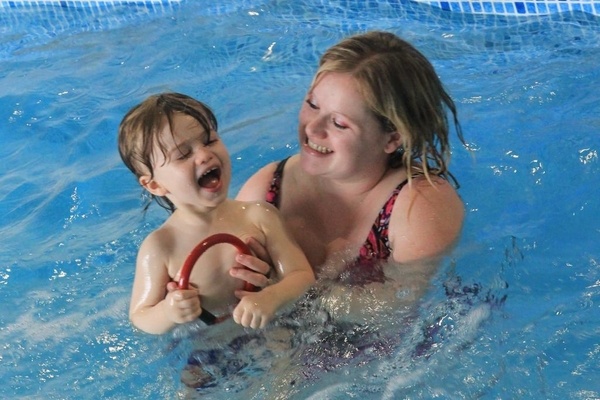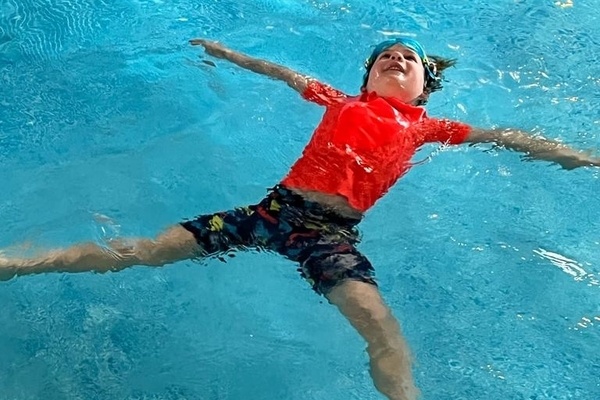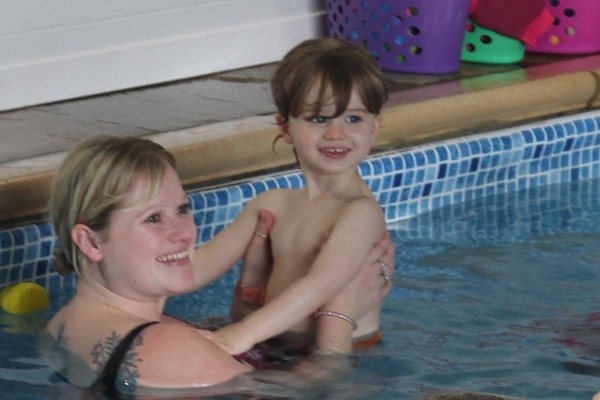I am delighted to introduce a really lovely blog written by our wonderful teacher Naomi who has three awesome boys, two of which have Autism and have needed additional support. This honest account of swimming lessons I hope will help other parents in learning how to support children further in the water.
By Naomi Hardy, a swimming teacher with Baby Squids

Autism is a spectrum – as a mum of two boys diagnosed with autism, I have learnt to whole-heartedly appreciate this, every child is unique and will have their own wonderful strengths as well as their needs. My boys are completely different from each other! My older son struggles with large groups, and with loud noises/ lots of noise – this manifests itself in unsettled behaviour and shouting or simply refusing to comply. In the swimming pool, this can mean disruptive behaviour or completely manic splashing! He finds listening difficult anyway so it’s much harder for him when it’s very noisy. I always find that complicated or long-winded instructions are tricky to process and he responds better to short clear instructions, a ‘now and next’ strategy often works, also giving time for him to think about the task before repeating it.

Children with autism take longer to process verbal instructions, giving choices is a very useful tool as it gives them control and can ease any anxiety. Many children find transitions challenging, and this is heightened autism – for example, my sons both hated when the class finished and needed the sign of the tidy up and goodbye song to allow them to calmly leave the pool. Their swimming teacher (mostly Alex at Baby Squids!) would really support this through her structure and understanding of what the boys might need ;0)
A pool environment can be a sensory overload for some children with autism. The noise, bright lights, close proximity of other children and their parents can all affect how a child is able to manage a class. A child with autism may avoid these sensory triggers by refusing to join in, demonstrating a lack of attention, or becoming upset or much louder themselves to compensate for the anxiety the environment is causing them. You may have a child who always drinks the water, spits or takes bites out of the woggles or floats? This could be sensory seeking behaviour and show needs that the child can’t control. If we help find ways to allow these children to meet these needs in the pool (whilst ensuring everyone is safe at all times) it can make a huge difference to the success of the lesson. For example, can the child eating the woggle be given a specific toy to ‘chew’ during parts of the lesson he finds trickier? Can the child who finds the noise unsettling be allowed to sit poolside and enter when feeling ready or to spend time playing with a toy they enjoy before being expected to follow instruction? And even more importantly can a parent be supported in feeling confident that changing the structure is a good thing to support their child.

During lessons, my older boy needed time to explore the water, blow bubbles, and splash before he was able to take part in an activity. He communicated with loud noises and loved role play so each week he was a different creature constantly telling the teacher “I’m a whale shark” for example! Alex showed the understanding he needed and the flexibility within the lesson to embrace these behaviours. This led to years of successful lessons where he would join in and listen – he was in a calm and happy place as he knew his needs were being met. He is now 7 years old and a confident and happy swimmer – he still spends the majority of his time under the water!
My youngest son struggles with anxiety and needs to feel in control, when he was a baby he enjoyed his lessons and loved the water. As he got older he found it difficult to join in with an activity if the toys on the poolside were attracting his attention; he simply couldn’t follow instruction until he had chosen a toy. His lovely swimming teacher (guess who!!) was fantastic and always tried to support his needs, for example using fewer toys, moving them to a different place and sometimes it was as simple as taking a step back and allowing him to jump into me a few times before moving on. He needed to finish what he was doing before feeling settled enough to choose to join in. Now at 5 years old he also loves swimming, although still on his own terms!

Our teacher team at Baby Squids are really dedicated to supporting every child’s development, each child and parent we meet and teach are unique, this makes our jobs very rewarding and very special indeed. If you have any questions about introducing children to the water then please do let us know and we would be happy to deliver free advice and guidance whether you can access lessons or not.
Much love Laura x
